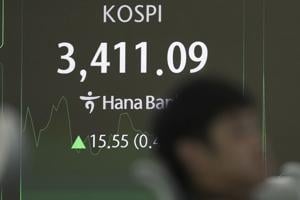Asian stock markets exhibited a mixed performance on Monday as investors reacted to last week’s rallies on Wall Street. The Hang Seng Index in Hong Kong increased by 0.1% to reach 26,421.63, while the Shanghai Composite Index saw a slight decline of 0.1%, settling at 3,866.37. Concerns about the state of China’s economy linger, as analysts indicate that August’s economic data does not suggest robust growth, particularly in light of the challenges posed by U.S. tariff policies.
According to Lynn Song, an economist at ING, “China’s economy continued to slide in August, with all key activity readings falling short of market forecasts once more.” Retail sales data for August revealed a growth rate of only 3.4%, marking a 12-month low and a decline from 5.7% in July and 6.8% in June. This slowdown raises questions about potential further stimulus measures from the Chinese government.
The economic landscape is shifting as Stephen Innes, managing partner at SPI Asset Management, noted, “The underlying flow is shifting. For years, Beijing leaned on exports as the carry trade that kept growth rolling even as property cracked.” He emphasized that the impact of tariffs set by former U.S. President Donald Trump has disrupted supply chains that were vital for China’s trade.
In Australia, the S&P/ASX 200 index experienced a slight decline of 0.2%, closing at 8,851.70. Meanwhile, South Korea’s Kospi index rose by 0.4% to 3,408.54. Japan’s stock market remained closed on Monday due to a national holiday.
Wall Street’s performance at the end of the previous week provided some context for Asian markets. The S&P 500 edged down by less than 0.1% from its all-time high reached on Thursday. The Dow Jones Industrial Average fell 273 points, or 0.6%, while the Nasdaq Composite gained 0.4%. Market analysts attribute the recent rallies to expectations that the U.S. Federal Reserve will cut interest rates during its upcoming meeting.
Should the anticipated interest rate cuts not materialize, there could be a negative reaction from the market. The S&P 500 concluded at 6,584.29, down 3.18 points, while the Dow Jones Industrial Average closed at 45,834.22, down 273.78. The Nasdaq Composite rose by 98.03 points to reach 22,141.10.
In bond markets, the yield on the 10-year Treasury note recovered somewhat, rising to 4.06% from 4.01% late the previous Thursday. Energy markets saw benchmark U.S. crude oil prices increase by 37 cents, reaching $63.06 per barrel, while Brent crude climbed 36 cents to $67.35 per barrel.
Currency trading saw the U.S. dollar inch up to 147.67 Japanese yen, compared to 147.65 yen previously. The euro remained stable at $1.1732.
As Asian markets continue to navigate these economic uncertainties, analysts will be closely monitoring upcoming data releases and geopolitical developments that could influence investor sentiment in the coming weeks.
